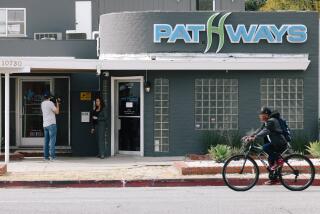Jury Acquits Kevorkian in Third Assisted Suicide Case
- Share via
DETROIT — Assisted-suicide crusader Jack Kevorkian was acquitted Tuesday in the third case that Michigan prosecutors have brought against him since 1994. He has never been convicted.
Jurors in Oakland County Circuit Court reached their verdict on the third day of deliberations. Several of them asked Kevorkian for his autograph afterward.
The retired pathologist had been charged under common law with two counts of assisted suicide in the 1991 deaths of Marjorie Wantz, 58, and Sherry Miller, 43.
Kevorkian’s previous acquittals, one in Oakland County and one in Wayne County, were tests of a now-expired state law banning assisted suicide.
“Three strikes and you’re out of play,” said Yale Kamisar, a constitutional law scholar at the University of Michigan who opposes legalizing assisted suicide. He suspects that Kevorkian will not be prosecuted again because “it would be politically disadvantageous to continue.”
Robert A. Sedler, a Wayne State University professor of law who represented the American Civil Liberties Union in a challenge to Michigan’s ban, said continued prosecutions would probably fail.
“This makes it very clear,” he said, “that a jury in Michigan will not convict a doctor for assisting a terminally ill person to end his life or for assisting a person in unendurable pain to end his life.”
The acquittal means Kevorkian “has been given the green flag,” said Michigan state Sen. Jim Berryman, who has introduced a bill calling for a statewide vote on assisted-suicide regulations. “He will continue to push the envelope.”
Oakland County Prosecutor Richard Thompson called the verdict “a disappointment, but the law is still there and I will still do my duty of enforcing the law.”
Kevorkian, 67, has acknowledged attending 28 suicides since 1990, including the death during his latest trial of Canadian right-to-die activist Austin Bastable, who suffered from multiple sclerosis. Hours after taking the stand to testify in his own defense, Kevorkian joined other doctors present when Bastable ended his life at the suburban home of Janet Good, founder of Michigan’s branch of the Hemlock Society. Thompson would not say whether he will charge Kevorkian in Bastable’s death.
The latest case was punctuated with Kevorkian’s trademark disdain for the proceedings at hand. He showed up garbed in a Colonial-era costume on the day that jury selection started, toting a scroll with a quote from Thomas Jefferson supporting the right to die.
He got permission from the judge to skip much of the testimony. He also threw a hallway tantrum, shouting at his attorneys that the trial was “a political lynching” and excoriating them for questioning a friend of Miller’s who broke down in tears on the stand. If convicted, Kevorkian would have faced up to five years in prison and $10,000 in fines on each count.
Miller and Wantz died together in a rural cabin on Oct. 23, 1991. Neither was terminally ill. Miller had multiple sclerosis and could not care for herself. She died of carbon monoxide poisoning. Wantz had severe pelvic pain; she died of a drug injection.
Prosecution medical experts testified that both women probably suffered from depression.
*
Kevorkian’s attorneys contended, as they had in earlier cases, that their client intended to stop pain and suffering, and that death was a byproduct of his treatment.
This time, the attorneys also argued that because the common law was unwritten, Kevorkian had no way of knowing he was committing a crime.
“We felt there was a lack of evidence regarding the interpretation of the common law, and that constitutes reasonable doubt,” said jury foreman Dean Gauthier.
“My feeling was that Dr. Kevorkian is a smart and intelligent man who cares deeply for his patients,” said juror Vince Muscillo.
Nauss reported from Detroit and Pasternak from Chicago. Times researcher John Beckham also contributed to this story.
More to Read
Sign up for Essential California
The most important California stories and recommendations in your inbox every morning.
You may occasionally receive promotional content from the Los Angeles Times.













